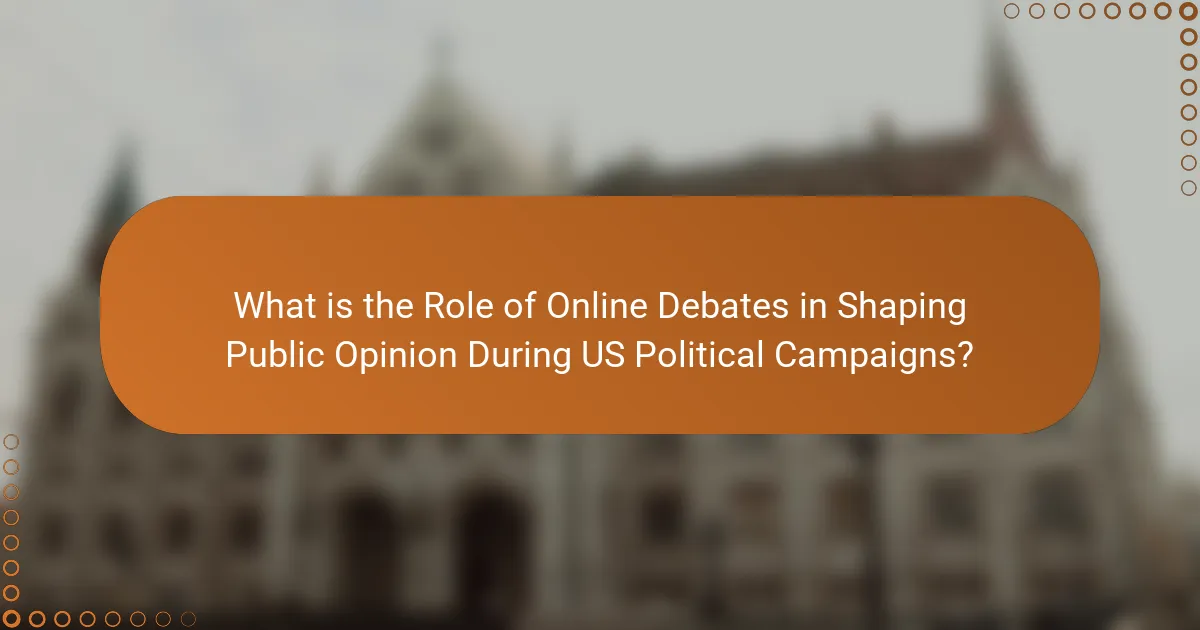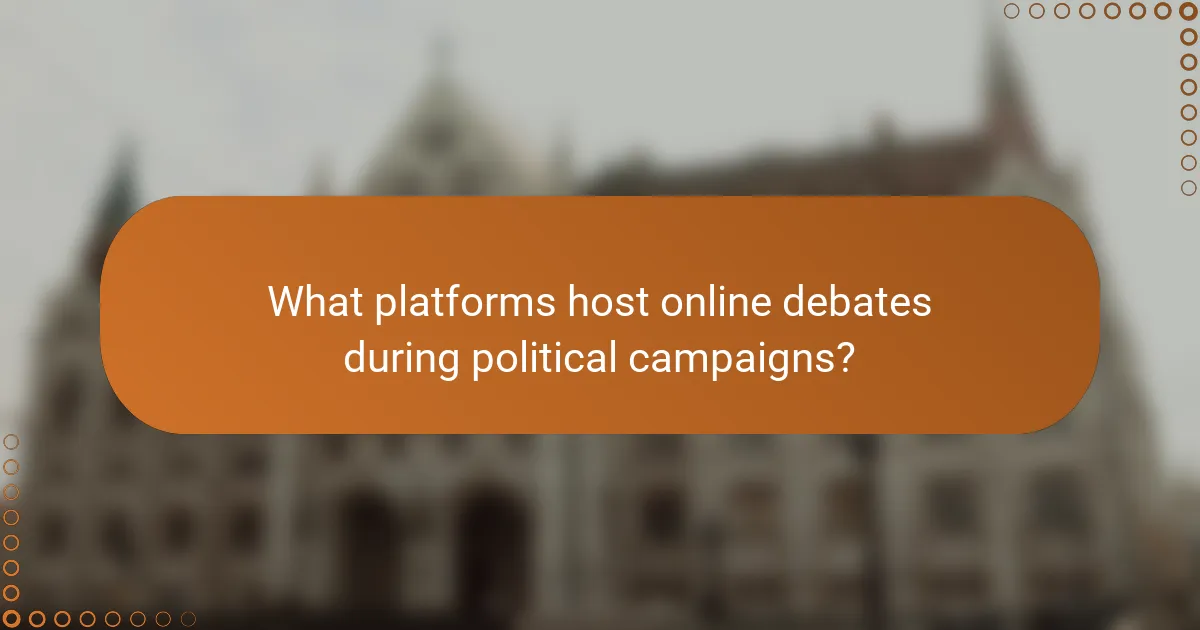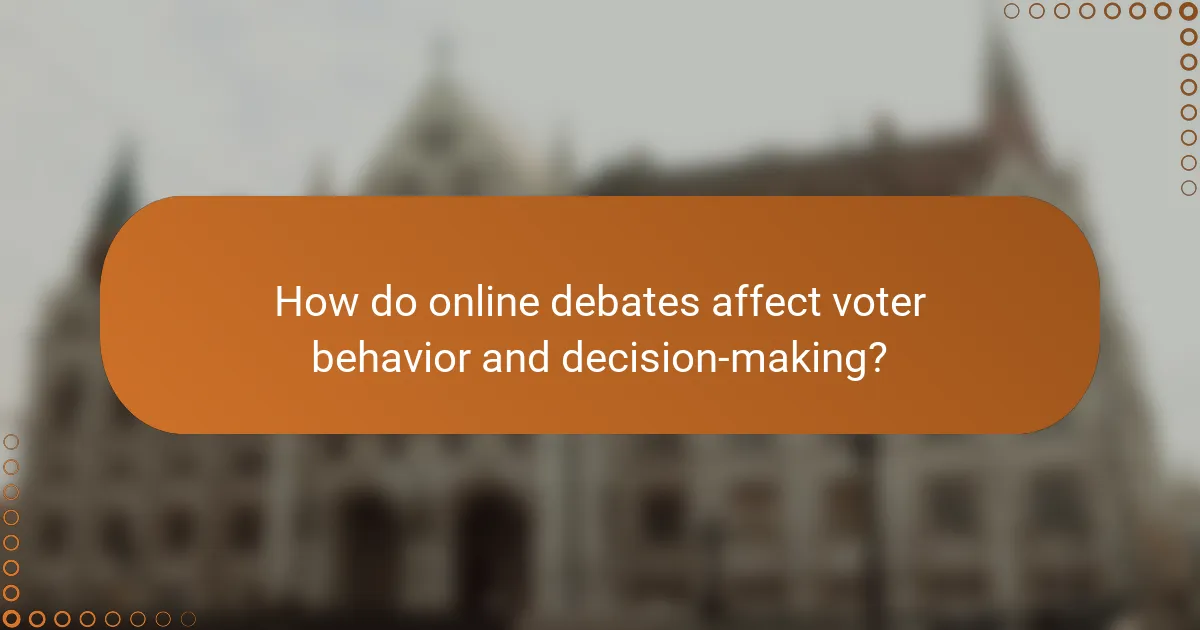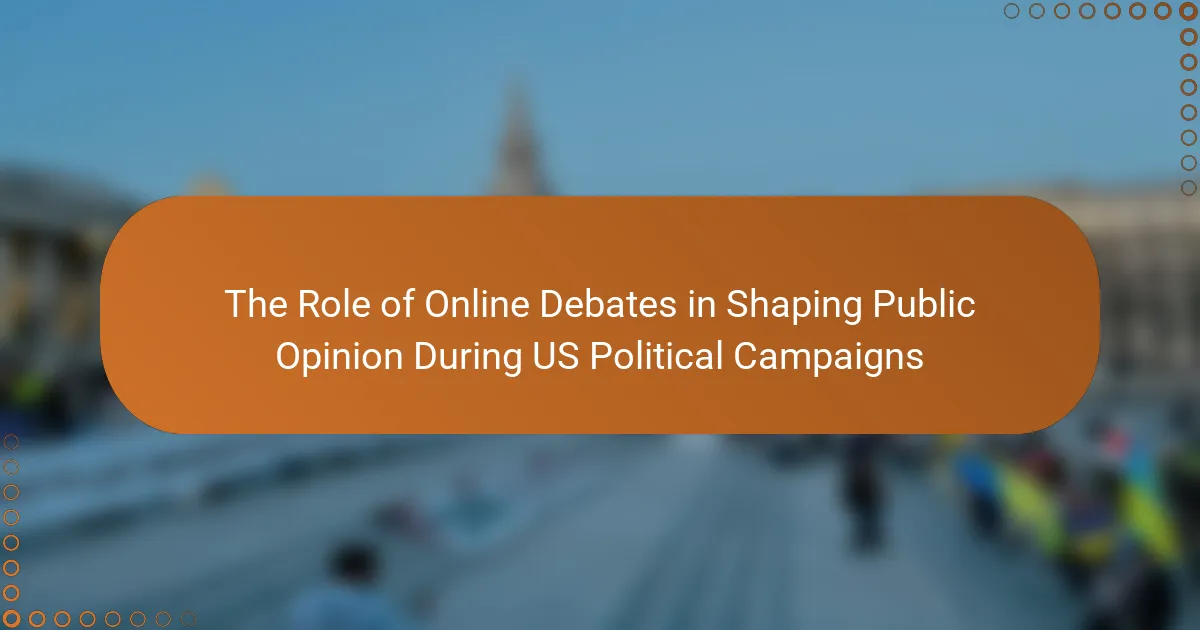Online debates are a critical component of US political campaigns, serving as platforms for candidates to directly engage with voters and present their viewpoints. These debates occur on social media platforms such as Facebook, Twitter, and YouTube, and facilitate real-time feedback, enhancing voter engagement and information dissemination. Research indicates that a significant percentage of voters are influenced by online discussions, with studies showing that exposure to these debates can alter perceptions and priorities. The viral nature of online content amplifies key messages, making online debates essential for shaping public opinion and influencing electoral outcomes.

What is the Role of Online Debates in Shaping Public Opinion During US Political Campaigns?
Online debates play a significant role in shaping public opinion during US political campaigns. They provide a platform for candidates to present their views and engage with voters directly. This interaction can influence voter perceptions and preferences. Research indicates that online debates can enhance voter engagement and information dissemination. For instance, a study by the Pew Research Center found that 69% of voters reported using social media to follow campaign news. Additionally, online debates allow for real-time feedback from the audience, which can sway undecided voters. The viral nature of online content can amplify key messages and create momentum for candidates. Overall, online debates are a crucial tool in modern political campaigning, shaping opinions through direct engagement and widespread reach.
How do online debates influence voter perceptions?
Online debates significantly influence voter perceptions by shaping opinions and attitudes towards candidates. They provide a platform for candidates to communicate their policies directly to voters. This direct engagement can enhance voter understanding of key issues. Research shows that exposure to online debates can shift voter preferences. For instance, a study by Pew Research Center found that 40% of viewers changed their opinion after watching a debate. Additionally, online debates facilitate interaction and discussion among viewers, which can reinforce or challenge existing beliefs. The immediacy of online platforms allows for rapid dissemination of information, affecting how voters perceive candidates in real time. Overall, online debates play a crucial role in informing and altering voter perceptions during political campaigns.
What are the key factors that determine the impact of online debates on public opinion?
The key factors that determine the impact of online debates on public opinion include audience engagement, the credibility of participants, and the framing of issues. Audience engagement influences how actively individuals participate and share opinions. Higher engagement often leads to greater shifts in public sentiment. The credibility of participants, such as experts or politicians, affects how persuasive their arguments are perceived. Research shows that messages from credible sources are more likely to be accepted by the audience. The framing of issues shapes how topics are understood and discussed. Different frames can lead to varying interpretations and reactions among the public. Additionally, the platform used for the debate can affect reach and accessibility, impacting overall public opinion.
How does social media engagement affect the outcomes of online debates?
Social media engagement significantly influences the outcomes of online debates. High engagement levels can amplify the visibility of arguments and perspectives. This visibility can sway public opinion by reaching broader audiences. Engaged users often share, comment, and react, creating a ripple effect. Research indicates that posts with higher interactions receive more attention and credibility. For example, a study by Pew Research Center found that 64% of Americans believe social media helps them stay informed about political issues. Therefore, social media engagement can directly affect which arguments are prioritized in online debates.
Why are online debates significant in the context of US political campaigns?
Online debates are significant in US political campaigns because they enhance engagement and accessibility. They allow candidates to reach a wider audience beyond traditional media. Online platforms enable real-time interaction and feedback from voters. This immediacy can influence public opinion rapidly. Studies show that online discussions can shape perceptions of candidates and issues. For example, a 2020 Pew Research study highlighted that 53% of Americans engaged with political content online. This engagement can lead to increased voter turnout and participation. Overall, online debates play a crucial role in modern political discourse.
What historical trends highlight the importance of online debates in politics?
Online debates have significantly influenced political discourse throughout history. The rise of the internet has democratized access to information and platforms for discussion. In the 2000 U.S. presidential election, online forums began to play a crucial role in shaping voter opinions. Social media platforms emerged as vital spaces for political engagement during the 2008 election. The 2016 election saw the proliferation of online debates, with candidates using Twitter and Facebook to communicate directly with voters. These platforms allowed for real-time interaction and immediate feedback on political issues. The importance of online debates was further emphasized during the COVID-19 pandemic, where traditional campaigning was limited. Research indicates that online discussions can sway public opinion and mobilize voters effectively.
How do online debates compare to traditional debate formats in terms of reach and engagement?
Online debates generally have a broader reach and higher engagement compared to traditional debate formats. Online platforms can host thousands of participants simultaneously, allowing for a global audience. Traditional debates are often confined to physical locations and limited seating. Engagement in online debates is enhanced through interactive features like live comments and social media sharing. Studies show that online debates can attract millions of viewers, while traditional formats typically reach fewer people. For example, the 2020 presidential debates drew about 73 million viewers on television, whereas online platforms hosted discussions with millions more participating in real-time interactions. This accessibility fosters a more dynamic exchange of ideas and opinions.

What platforms host online debates during political campaigns?
Social media platforms host online debates during political campaigns. Popular platforms include Facebook, Twitter, and YouTube. These platforms allow candidates to engage directly with voters. Online debates can reach a wide audience quickly. Additionally, dedicated debate platforms like Debate.org facilitate structured discussions. These online spaces encourage public participation and opinion sharing. Research indicates that social media significantly influences voter perceptions. Online debates have become integral to modern political campaigns.
Which social media platforms are most effective for online political debates?
Twitter and Facebook are the most effective social media platforms for online political debates. Twitter allows real-time engagement and rapid dissemination of information. It has a character limit that encourages concise arguments. Facebook provides a larger space for discussion and community building. It supports long-form posts and group interactions. Research shows that Twitter is favored for breaking news and immediate reactions. Facebook is often used for in-depth discussions and sharing articles. Both platforms have significant user bases, enhancing their reach and influence in political discourse.
What features do these platforms offer to enhance debate engagement?
Debate platforms enhance engagement through interactive features. These features include real-time polling to gauge audience opinions. Live chat allows participants to discuss points as debates unfold. Video streaming offers high-quality visuals for better viewing experiences. Users can submit questions to moderators for direct interaction. Analytics tools provide insights into audience engagement levels. Social media integration enables sharing of debates for wider reach. Personalized notifications keep users informed about upcoming debates.
How do different platforms cater to diverse audience demographics?
Different platforms cater to diverse audience demographics by tailoring content and features to specific user preferences. Social media platforms like Facebook and Instagram focus on visual content, appealing to younger audiences. LinkedIn targets professionals, offering networking opportunities and industry-related discussions. YouTube provides varied content types, from educational to entertainment, attracting a broad age range. Platforms also use algorithms to personalize user experiences based on behavior and interests. For instance, TikTok’s algorithm promotes short, engaging videos that resonate well with Gen Z. Research shows that 71% of teens use Instagram daily, highlighting its appeal to younger demographics.
What role do moderators play in online political debates?
Moderators in online political debates facilitate discussions and ensure adherence to rules. They manage time limits for responses to maintain a structured dialogue. Moderators also intervene to prevent personal attacks, ensuring a respectful atmosphere. They guide the conversation by introducing topics and directing questions to participants. Their role includes fact-checking statements made during the debate to uphold accuracy. Effective moderation can enhance audience engagement and comprehension. Studies show that well-moderated debates can lead to more informed public opinions.
How do moderators influence the flow and fairness of online debates?
Moderators influence the flow and fairness of online debates by ensuring balanced participation and managing discourse. They set rules that guide the interactions among participants. This helps to prevent domination by any single voice. Moderators also intervene to clarify questions or redirect discussions when they become unproductive. Their role includes enforcing time limits, which maintains the pace of the debate. By doing this, they help to keep the conversation focused on relevant topics. Additionally, moderators can mute or remove participants who violate guidelines. Research indicates that effective moderation can lead to more equitable outcomes in discussions. Studies show that structured moderation improves the quality of debate and participant satisfaction.
What are the challenges faced by moderators in online debate settings?
Moderators in online debate settings face several challenges. One challenge is managing participant behavior. Participants may engage in disruptive or aggressive communication. This can derail the debate and create a hostile environment. Another challenge is ensuring balanced representation. Moderators must provide equal opportunities for all viewpoints. This is particularly difficult when some participants dominate the conversation. Additionally, moderators must address misinformation. They need to fact-check claims in real-time to maintain credibility. Technical issues also pose a challenge. Connectivity problems can interrupt discussions and frustrate participants. Lastly, maintaining focus on the debate topic is crucial. Moderators must steer conversations back to the main subject when they stray. These challenges can hinder the effectiveness of online debates.

How do online debates affect voter behavior and decision-making?
Online debates significantly influence voter behavior and decision-making. They provide a platform for candidates to present their views directly to the electorate. Voters can compare candidates’ positions in real-time. This comparison can sway opinions and alter perceptions of candidates. Research shows that exposure to online debates increases voter engagement. A study by the Pew Research Center found that 62% of voters reported being influenced by online discussions. Additionally, online debates often amplify specific issues that resonate with voters. This can lead to shifts in voter priorities and preferences. As a result, online debates play a crucial role in shaping electoral outcomes.
What psychological effects do online debates have on voters?
Online debates significantly influence voters’ psychological states. They can enhance political engagement among participants. Voters often experience increased confidence in their political opinions after engaging in debates. Exposure to opposing views may lead to cognitive dissonance, prompting reevaluation of beliefs. Additionally, online debates can foster group polarization, where individuals adopt more extreme positions. Emotional responses, such as anger or enthusiasm, are common during debates. Research indicates that social media interactions during debates can amplify these emotions. The overall effect is a heightened sense of political identity and community among voters.
How do emotions expressed during online debates impact voter choices?
Emotions expressed during online debates significantly impact voter choices. Emotional responses can shape perceptions of candidates and their messages. Research indicates that voters are more likely to be influenced by emotionally charged content. Positive emotions can enhance a candidate’s likability, while negative emotions may lead to distrust. A study by the Pew Research Center found that emotionally resonant posts are shared more frequently, amplifying their reach. This sharing can create echo chambers, reinforcing existing beliefs. Consequently, voters may align with candidates who evoke strong emotional reactions. Overall, the emotional tone of online debates plays a crucial role in shaping voter decisions.
What role does misinformation play in shaping voter perceptions during online debates?
Misinformation significantly influences voter perceptions during online debates. It can distort facts and create misconceptions about candidates and policies. Studies show that misinformation spreads rapidly on social media platforms. For instance, a 2018 study by Vosoughi, Roy, and Aral found that false news stories are 70% more likely to be retweeted than true stories. This rapid spread can lead to polarized views among voters. When misinformation is prevalent, it can overshadow factual information. Consequently, voters may base their decisions on distorted narratives rather than reality. This phenomenon undermines informed decision-making in elections.
What strategies can candidates use to maximize the effectiveness of online debates?
Candidates can maximize the effectiveness of online debates by preparing thoroughly and engaging actively. They should research the debate format and understand the rules. Familiarity with key issues and opponents’ positions is crucial. Candidates must practice clear and concise communication. This helps in articulating their points effectively. Utilizing visual aids can enhance their arguments. Engaging with the audience through social media during the debate can increase visibility. Candidates should also remain calm and composed under pressure to maintain credibility. These strategies improve candidates’ chances of resonating with viewers and influencing public opinion.
How can candidates prepare for online debates to enhance their message delivery?
Candidates can prepare for online debates by practicing their delivery and refining their messages. They should rehearse their key points multiple times. This builds confidence and ensures clarity. Candidates can also record themselves to analyze body language and vocal tone. Feedback from peers can provide valuable insights for improvement. Familiarity with the debate platform is crucial for smooth navigation. Researching opponents’ positions helps anticipate counterarguments. Staying informed about current events enhances the relevance of their points. Effective preparation can significantly improve message delivery during online debates.
What engagement techniques can candidates employ to connect with viewers during online debates?
Candidates can employ several engagement techniques to connect with viewers during online debates. Utilizing eye contact through the camera fosters a personal connection. Incorporating relatable anecdotes makes discussions more engaging and authentic. Asking rhetorical questions encourages viewer reflection and participation. Responding directly to viewer comments creates a sense of involvement. Using visual aids can simplify complex information and maintain interest. Employing a conversational tone makes the debate feel more approachable. Finally, showcasing empathy toward viewer concerns builds trust and rapport. These techniques enhance viewer engagement and can positively influence public perception.
What best practices should voters follow when participating in online debates?
Voters should follow several best practices when participating in online debates. First, they must verify information before sharing it. Misinformation can spread rapidly online, influencing opinions negatively. Engaging respectfully with others is also crucial. Respectful dialogue fosters constructive discussions. Voters should focus on facts rather than emotions. This approach helps maintain clarity in arguments. Using credible sources enhances the quality of contributions. Citing reputable studies or data strengthens the validity of claims. Lastly, voters should remain open-minded. Being receptive to differing viewpoints promotes a healthy exchange of ideas.
The main entity of the article is online debates and their role in shaping public opinion during US political campaigns. The article examines how online debates provide a platform for candidates to engage directly with voters, influencing perceptions and decision-making. Key factors affecting their impact include audience engagement, credibility of participants, and the framing of issues. The significance of social media in amplifying debates and the challenges faced by moderators are also discussed. Additionally, the article highlights strategies candidates can employ to enhance their effectiveness in online debates and best practices for voter participation.
